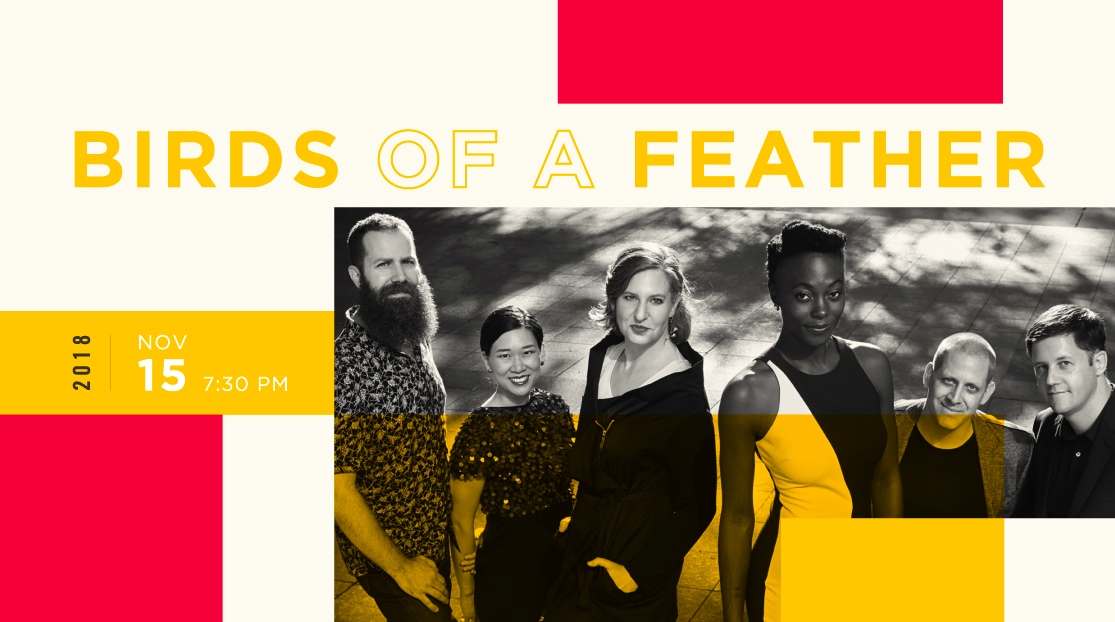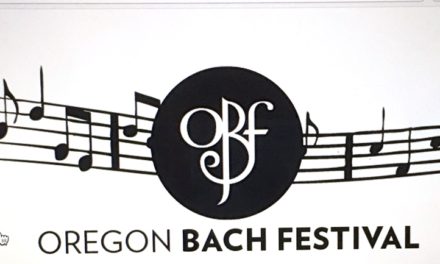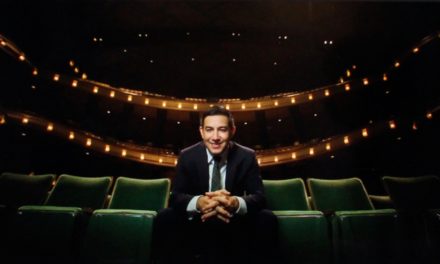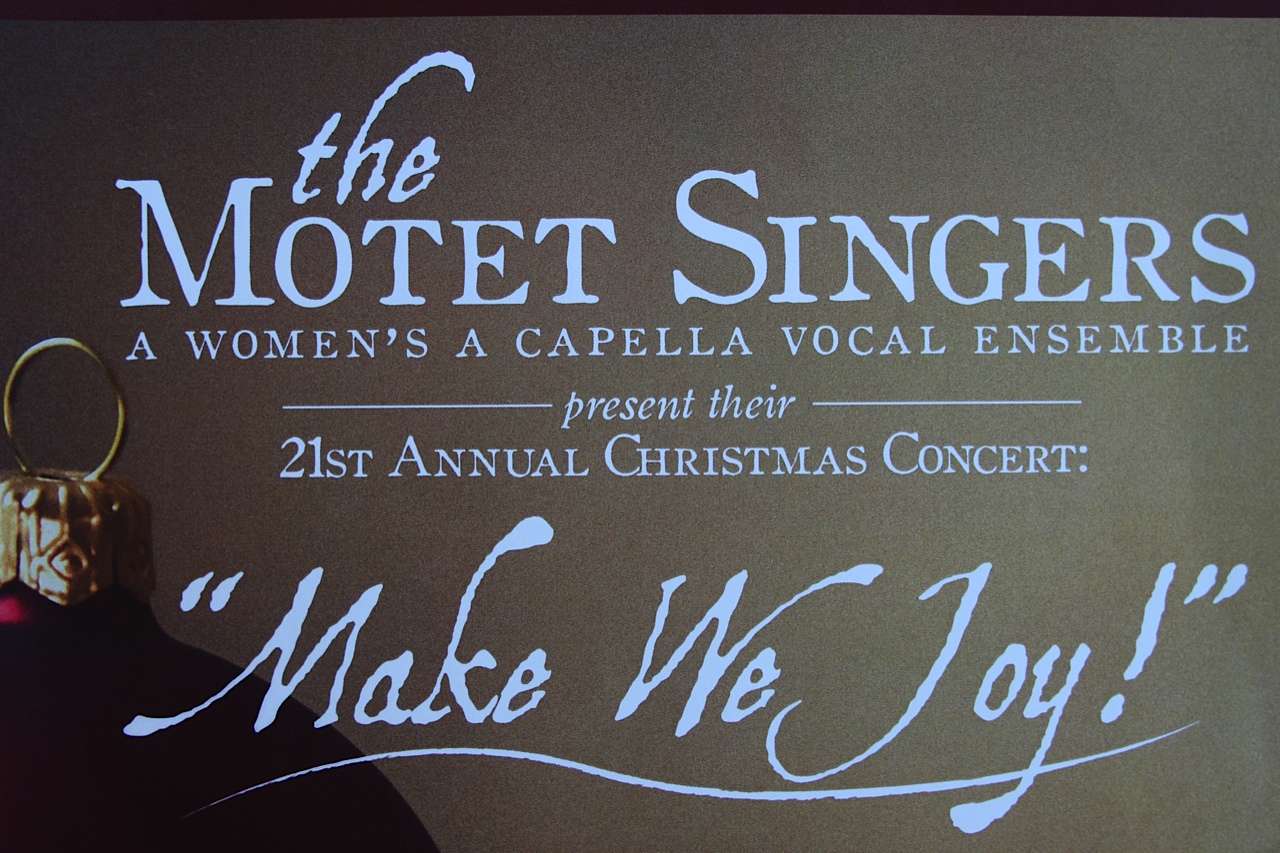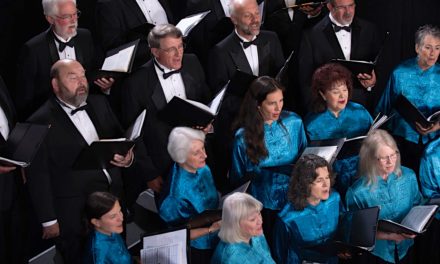(Above: The Grammy-winning sextet Eighth Blackbird comes to Eugene to play On a Wire, a concerto composed specifically for the group by Grammy- and Pulitzer Prize-winning composer Jennifer Higdon.)
By Randi Bjornstad
There’s a special treat in store for concertgoers to Birds of a Feather, the title given to the Eugene Symphony’s concert on Nov. 15.
The multi-Grammy-winning, Chicago-based sextet known as Eighth Blackbird will be on hand to play a concerto called On a Wire — also referring to birds — by not only Grammy- but also Pulitzer Prize-winning composer Jennifer Higdon, who unfortunately can’t make it West herself but sends greetings, via a recent telephone interview, to the Eugene audience.
The composer and the sextet (playing flute, clarinet, piano, percussion, violin, and cello) have known each other for 20 years, although there have been a few personnel change-ups in the sextet during that time.
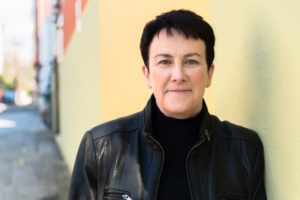
Composer Jennifer Higdon
“My first contact with them was when we applied together for a grant, and I wrote a chamber piece called Zaka for them as part of their CD called Strange Imaginary Animals,” composer Higdon recalled. “That was when we first talked about the idea of working together on a concerto.”
That eventually turned into On a Wire, which Higdon admits is “an unusual piece,” as it conjures up images of migrating birds perched on a wire or even acrobats performing a high-wire act, “but it seemed perfect” for the composition.
“It has a surprise beginning,” she said. “When we were first discussing the piece, the musicans had been asking me if they could move around onstage. That gave me an idea, but it was very hard to write and choreograph.”
First of all, Higdon wrote On a Wire so that each player has ample solo time during the performance, rather like a jazz ensemble that moves from featuring one instrument after another.
But beyond that, the performers start out on stage gathered around the piano to take their opening bows, after which they begin the performance by using bows on the piano strings to create a whole new and different sound.
“When audiences see and hear that, they often go berserk,” Higdon said.
She surmises that she developed her unusual relationship to music because she started at it rather late. She didn’t start playing an instrument — the flute — until she taught herself to play at age 15 on an old flute her family had in the house. She didn’t take formal lessons until she was 18, and she didn’t start composing until she was 21.
“I didn’t exhibit any extra talent,” Higdon said, crediting her success at out-of-the-box composition with the fact that she grew up listening to rock music, “and I observed that rock concerts are so engaging and get people so involved that I wanted to write like that for the audience.”
It obviously worked. At 55, Higdon not only has won numerous awards in the classical music world, she also has two Grammys from 2010 and 2018 and the Pulitzer Prize in Music in 2010 for her Violin Concerto.
None of that appears to have gone to her head, as she explains in what she calls her “mixture of Tennessee, Georgia, and Philly” accent.
“When I was told I had won the Pulitzer, I was in shock — I was thinking, ‘What just happened?’ ” she said laughing. “I don’t think I slept much for a couple of months, and sometimes I would go places and someone would say, ‘And today we have a Pulitzer prizewinner in our midst, and I would look around to see who they were talking about and then realize they were talking about me.’ “
Soon enough, though, she realized that “once you win the Pulitzer, professionally from then on you have a target on your back.”
She dealt with that by doing what she always has done — keep her head down and work.
“The trick I had discovered long ago was to just keep writing, keep doing something familiar,” Higdon said. “I write all day, every day. I am lucky that so many people ask me to write for them — I have been fortunate all during my career to be able to make a living by writing.”
She keeps each piece fresh by working on one composition at a time.
“Sometimes it takes a couple of weeks to make the transition from one piece to the next, but I work all day every day, and when I finish one thing, I immediately start trying to find the harmonic for the next one.”
She likes to think of her repertoire as “kind of joyous.”
Eighth Blackbird’s flutist, Nathalie Joachim, agrees.
“I think Jennifer Higdon is such an inspiration,” Joachim said. “She’s a hard worker, she never gets discouraged, and she has that kind of spirit — a sense of joy — about what she does.”
Since Higdon also started out playing flute, Joachim feels a bit of extra pressure with On a Wire.
“This is my fourth season with Eighth Blackbird, so I am comfortable with it, but it is technically challenging, and since Jennifer (Higdon) started out as a flutist herself, I always hope I will do something dazzling,” she said. “We are all strong musicians, but this piece is such a challenge that we never take it for granted.”
She laughs as she thinks about the first minutes of the performance.
“It is a funny experience to come out, take a bow, then put your instrument down and go to the piano with your back to the audience,” Joachim said. “I can’t say I had ever used a bow inside a piano before — I had never been asked! — but I think most people are mesmerized by that, and they are drawn instantly into the experience.”
The title of the Eugene Symphony’s November concert, Birds of a Feather, comes from the relationship of the Higdon composition and its performers with the rest of the program.
The evening starts out with Johan Sebastian Bach’s Brandenburg Concerto No. 3, which also features the composer creating an unusual series of solo performances within a larger work.
In addition, music director and conductor Francesco Lecce-Chong said in announcing the program, Bach and Higdon also share the characteristic of composing in layers, from solo to chamber to orchestral.
On a Wire comes next, and the second half of the program consists of what Lecce-Chong calls “street dance music,” including Six German Dances by Wolfgang Amadeus Mozart.
Then it culminates the symphony’s three-month homage to composer and conductor Leonard Bernstein with his jazz ballet, Fancy Free, that tells the story of three American sailors on shore leave in New York City during World War II.
Birds of a Feather
When: 7:30 p.m. on Thursday, Nov. 15; concert preview at 6:30 p.m. in The Studio on the lower level of the Hult Center
Where: Silva Concert Hall, Hult Center for the Performing Arts, One Eugene Center (Seventh and Willamette streets in downtown Eugene)
Tickets: $27 to $62, available at the Hult Center box office, 541-682-5000, or online at hultcenter.org/
Information: jenniferhigdon.com, eighthblackbird.org

